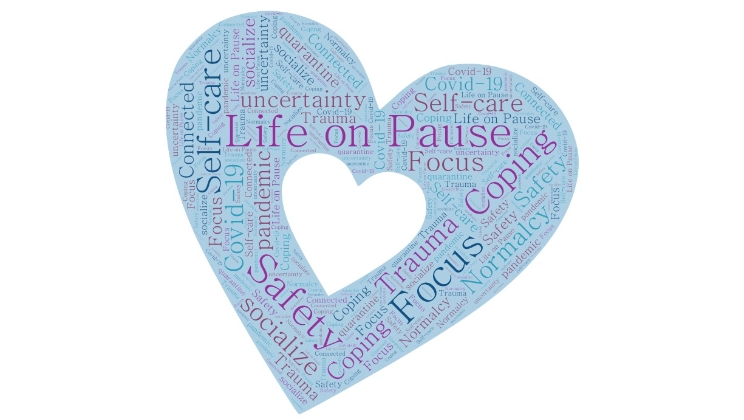
The COVID-19 pandemic is considered a “collective trauma” because we are all experiencing its impact together as a society. Some of us have had direct exposure to COVID-19 by getting sick or losing our jobs, while others have had to witness loved ones get sick or pass away. Learning that a relative or close friend has been exposed to COVID-19 has been traumatic, as has indirect exposure to aversive details of COVID-19, usually in the course of professional duties (ex. first responders, medics, mental health professionals, etc.).
So, what do you do when all of a sudden you’re in the throes of a pandemic without any frame of reference on how to cope with it?
As a trauma specialist, I’ve had the opportunity to cultivate and share powerful coping skills to help so many people during COVID-19. Many of them have been triggered by the various aspects of the pandemic, from feeling confused and powerless, to feeling isolated and disconnected. For most of their lives, they have had a frame of reference in how to handle a stressor because they have experienced it before, but now they are having to “make it up as they go.” We all have had to come up with new ways of coping as many of our previous ways of coping are no longer options (ex. going out to eat, attending parties, trips, concerts, going to a theatre).
Typically, when we are going through something traumatic, knowing that there is an “end in sight” helps us cope with it. The ongoing and constantly changing nature of COVID-19 presents a new level of anxiety and uncertainty. We want to know when life will be “normal” again, when we can feel safe again, when we can socialize in the ways that we used to. We want reassurance that everything will be okay. But until then, here are some tips that may help you gain a sense of normalcy, safety, clarity, focus, and connection.
Creating a Sense of Normalcy
Everything has changed and we feel relatively unprepared, which causes us to feel uncertain. It’s human nature to want some predictably in our daily lives, as knowing what is coming next helps to feel in control. Too much predictably and it’s boring, but we’ve swung the other direction and had nothing but uncertainty for the past year.
- Create a daily schedule for yourself/structure your days.
- Get up, get showered, and get dressed for your day.
- Focus on what’s staying the same (“I still have a place to live, I have food, I am in contact with my therapist, I still have my pet, I am still connected to my friends/family”).
- Dedicate certain spaces at home for work and for leisure.
- Go outside at least 10-30 minutes a day for sunlight and to change your environment.
Creating a Sense of Safety
We cannot immediately fix that we are facing a force of nature that is causing harm and death, but taking proactive measures by following public health guidelines puts the control back in our hands.
- Try engaging in “healthy escapism” such as getting lost in a book rather than unhealthy escapism such as alcohol or drugs.
- Pick up a new hobby or project (check out Knots of Love).
- Binge-watch something on Netflix.
- Clean your house, organize your drawers and closets.
- Let yourself visualize a safe or calm place in your mind (the Calm and Headspace Apps are very popular).
- Take a long nap.
Reducing Confusion and Finding Clarity
Feeling confused can feel scary as it is very disorienting. It’s been difficult for most of us to process the magnitude of the global impact that COVID-19 has caused. Knowledge and information can help us feel less confused and more empowered, but can also be triggering.
- Try to find a balance between staying informed and not feeling overwhelmed by the news and social media.
- Find a loved one that you trust to be the source of information for you instead of watching the news.
- Set limits on how long or frequently you check the news or social media or go on a “news hiatus.”
Improving Memory and Concentration
Traumatic stress often impacts memory, concentration, and focus. It can make us feel super scatterbrained which then makes us feel more stressed.
- Set reminders for yourself.
- Keep a planner or calendar.
- Write things down as you think of them.
- Make lists.
- Give yourself grace if you miss an appointment or forget to complete a task that is important to you.
Staying Connected to Others
I remember thinking to myself in the first weeks of the pandemic that it was cruelly ironic that a pandemic forces us to isolate from one another at a time when we need connection the most. It’s important to remember that we are problem solving together as fast and as best we can.
- Look up online support groups, online counseling, schedule Zoom visits with friends and family.
- Process your feelings about COVID-19 as they arise as this helps mitigate trauma symptoms.
- “Microinteractions” that you have with others (ex. a 2-3 minute with the cashier at the grocery store) help promote feelings of connection.
Staying Connected to Yourself
Feeling “spaced out” or disconnected is very common when being faced with stress. You may feel as if “this is not happening to me” or like you’re in a dream. Or you may have the experience of unreality, distance, or distortion (e.g., “things are not real”).
- Try using your 5 senses to feel connected to your body (name 5 things you see, hear, smell, feel, taste).
- Take a shower or bath.
- Practice deep breathing.
- Laugh at funny YouTube videos.
- Put your feet on the ground, or lay on the ground.
- Move your body, walk fast, or stretch.
- Drink a cold glass of water or warm tea.
- Hum vigorously or sing a song.
It’s healthy and necessary right now to readjust our expectations for ourselves (and others) as we go through this trauma collectively. We are all struggling and suffering. Be kind to yourself, and give yourself credit where it is due. I have been blown away by how resilient people have been in learning new ways of coping in response to COVID-19. Yes, we are powerless against the forces of nature, but we are not powerless in how we choose to cope with what we are experiencing. We have choices on how we respond emotionally and relationally. We have a choice to feel like victims of COVID-19, or we can choose to adopt a survivor mentality and prove to ourselves just how resilient we really are as humans.
Face your fears. Live with uncertainty. Take control of your life.
Jen Powell, LPC
Licensed Professional Counselor
Clinical Associate, Anxiety Specialists of Atlanta
Jen Powell, LPC specializes in the assessment and treatment of anxiety disorders, trauma, and OCD in adults

